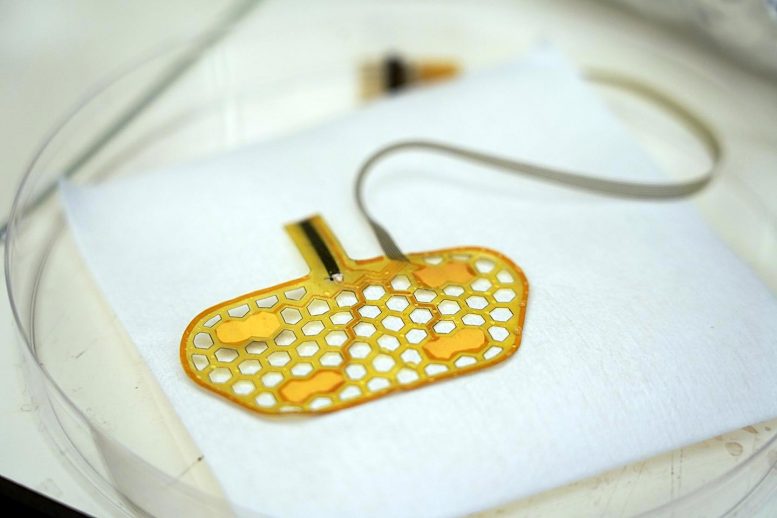
A wearable monitoring device to make treatments easier and more affordable for the millions of people with swallowing disorders is about to be released into the market.
Georgia A. Malandraki, an associate professor of speech, language, and hearing sciences in Purdue University’s College of Health and Human Sciences, and Chi Hwan Lee, an assistant professor of biomedical engineering and mechanical engineering in Purdue’s College of Engineering, founded Curasis LLC and serve as an acting chief executive officer and chief technology officer, respectively. They started the company to commercialize their wearable technology and move it as quickly as possible to clinics and people with swallowing difficulties.
See below for a video about the technology. The technology is presented in the December 13, 2019, edition of Science Advances.
“We want to provide a reliable, patient-friendly, and affordable way to treat the millions of people with swallowing disorders,” Malandraki said. “Many devices to help these people are expensive, not able to be taken home, and not accessible in many rural areas.”
The researchers created a skin-mountable sensor sticker that attaches firmly to the neck area and is connected with small cables to a wireless transmitter unit.
The skin-mountable sensor sticker measures and records muscle activity and movement associated with swallowing. The information is then sent wirelessly by a separate unit clipped on the wearer’s shirt to software that stores it for later analysis by a doctor.
Successful completion of a swallow requires the precise coordination of more than 30 pairs of muscles of the head and neck, six pairs of cranial nerves, and complex circuitry in the brainstem and several brain areas. Any disruption in these pathways can result in severe swallowing disorders.
More than 9 million adults and more than 500,000 children experience severe swallowing disorders each year in the U.S.
“Our device is unique in that we specifically created it to work well with the small and intricate muscles associated with swallowing events,” Lee said. “The sensor sticker is stretchable and flexible to work well with the skin and curvilinear head and neck shape, while the connected unit has electronic chips and more rigid components.”
The sensor stickers are disposable, designed with inexpensive components and meant to be used about 10 times before they are thrown away.
Reference: “Flexible submental sensor patch with remote monitoring controls for management of oropharyngeal swallowing disorders” by Min Ku Kim, Cagla Kantarcigil, Bongjoong Kim, Ratul Kumar Baruah, Shovan Maity, Yeonsoo Park, Kyunghun Kim, Seungjun Lee, Jaime Bauer Malandraki, Shitij Avlani, Anne Smith, Shreyas Sen, Muhammad A. Alam, Georgia Malandraki and Chi Hwan Lee, 13 December 2019, Science Advances.
DOI: 10.1126/sciadv.aay3210
Malandraki and Lee have completed pre-clinical tests of the device and are currently conducting clinical trials. They are working with the Purdue Research Foundation Office of Technology Commercialization on patenting their technology. They are seeking additional partners.
They also have worked closely with the Purdue Foundry, a commercialization hub in Purdue’s Burton D. Morgan Center for Entrepreneurship. Anne Smith, who retired as a distinguished professor in speech, language, and hearing sciences, serves as a senior advisor to the Curasis team.
Never miss a breakthrough: Join the SciTechDaily newsletter.